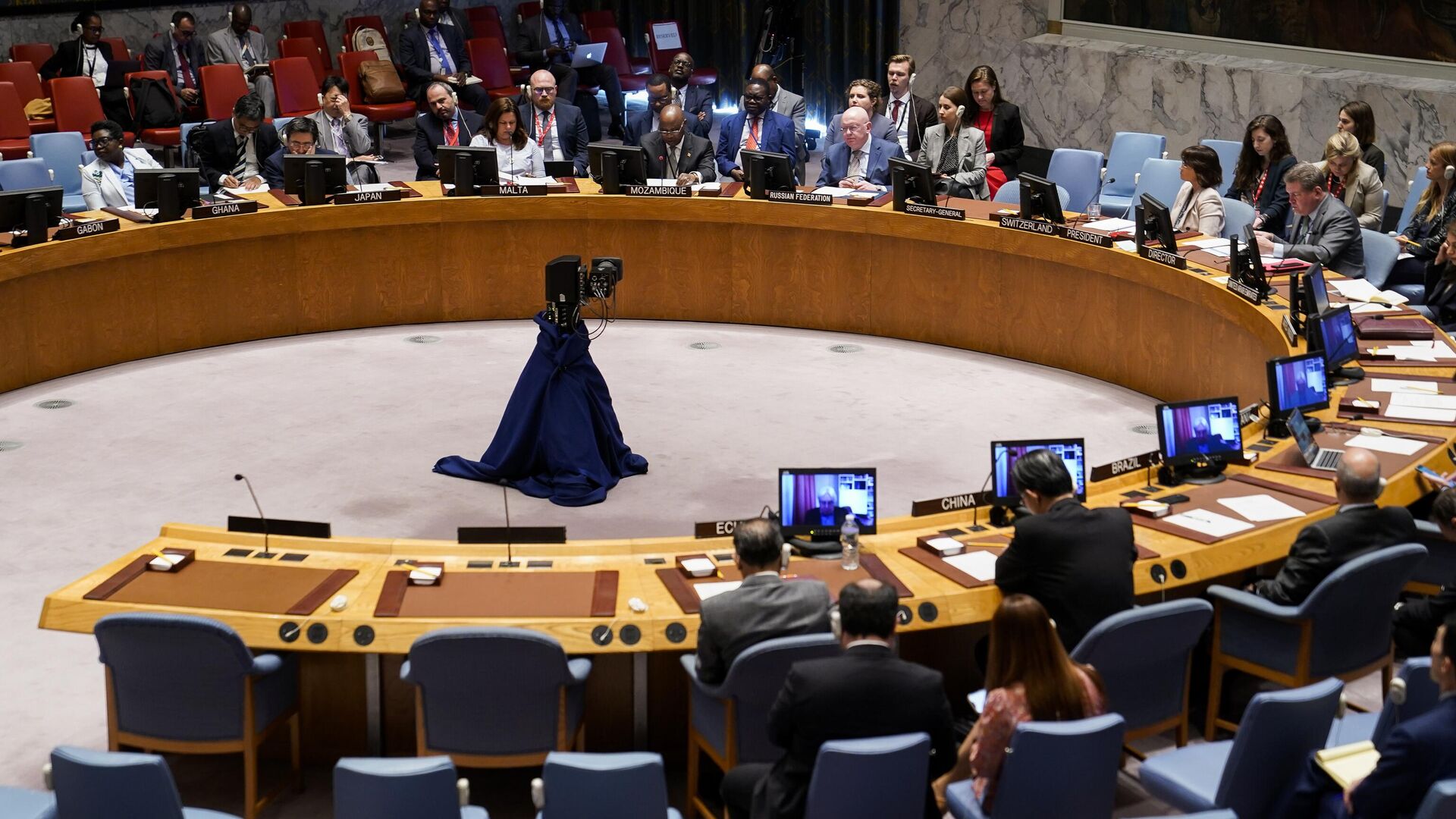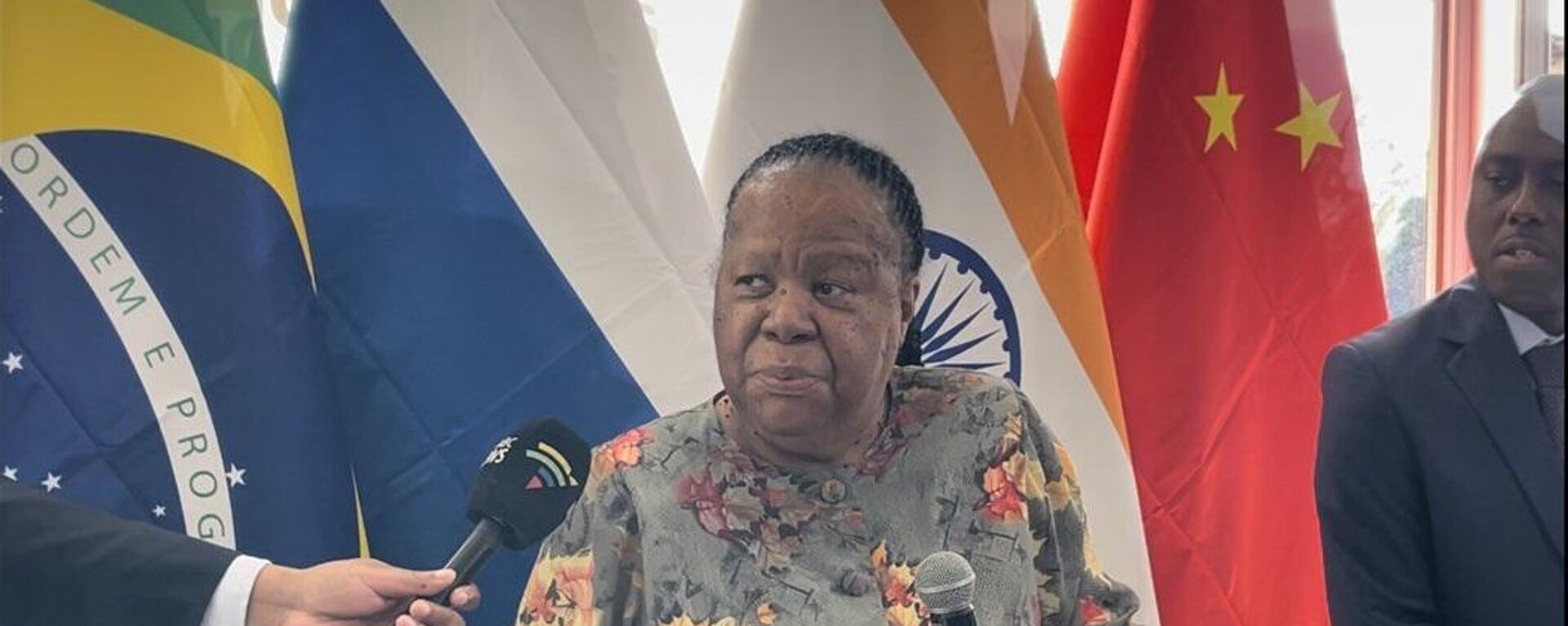https://en.sputniknews.africa/20230607/what-does-unsc-non-permanent-member-status-give-to-algeria--sierra-leone-1059765185.html
What Does UNSC Non-Permanent Member Status Give to Algeria & Sierra Leone?
What Does UNSC Non-Permanent Member Status Give to Algeria & Sierra Leone?
Sputnik Africa
On 6 June, the 77th session of the UN General Assembly held elections for five non-permanent seats of the Security Council for the 2024-25 term. The Security... 07.06.2023, Sputnik Africa
2023-06-07T14:36+0200
2023-06-07T14:36+0200
2023-08-03T10:47+0200
sub-saharan africa
sierra leone
algeria
united nations (un)
united nations security council (unsc)
politics
https://cdn1.img.sputniknews.africa/img/07e7/06/07/1059765699_0:160:3072:1888_1920x0_80_0_0_1223770fc199c57aa32b9409dd4dd72a.jpg
Algeria and Sierra Leone have been elected to the United Nations Security Council (UNSC) to join as two non-permanent members representing Africa for a two-year period, starting from January next year. The UNSC, one of six groups of the UN, comprises 15 countries, five of which - China, France, Russia, the United Kingdom and the United States - are permanent members with the right to veto any resolution or decision, and therefore stall the organ's decision-making process. The remaining 10 non-permanent members are elected by the General Assembly - the 193 UN member states - and in line with geographical distribution by region. Unlike permanent members, they serve on a rotational two-year, non-consecutive term without veto right.As places in the non-permanent category are allocated per region, Africa has three seats, which are at present occupied by Mozambique, Ghana and Gabon. In this election, only two seats allocated for Africa were up for replacement. The UN member states also voted to fill three council seats allocated one each to the Asia-Pacific Group, Eastern Europe and Latin America and the Caribbean.Other newly elected countries include Guyana, the Republic of Korea, and Slovenia. The five nations will join Ecuador, Japan, Malta, Mozambique and Switzerland as non-permanent members of the council in January.Even though non-permanent members of the UNSC don't have a veto, they represent their regions by being involved in global security briefings and voting on council's decisions. Moreover, the organ's procedures offer other opportunities to its temporary members to make tangible contributions to its work.Apart from that, chairing the council’s subsidiary bodies is mostly reserved for non-permanent members. More than 20 active subsidiary bodies include either committees formed to oversee economic sanctions regimes enacted by the body's resolutions or working groups aimed at addressing various thematic issues.Advancing Africa's Interests in UNSC Sierra Leone's President Julius Maada Bio, announcing his country’s bid last year, described the decision as a step towards fulfilling a desire to promote and ensure global peace. It was noted that the nation is going to use its civil war experience to advance international security and contribute to efforts made by Africa to reform the UN Security Council.At present the country chairs the African Union’s Committee of Ten, which is charged with harmonizing Africa's position on the reform of the UNSC. The continent is seeking to get two permanent seats in the council, as well as an additional two seats as non-permanent representatives. Earlier this month, South Africa's Foreign Minister Naledi Pandor reiterated that African countries should be better represented on the council. This view coincides with that of most of African nations, as well as other nations around the world. For example, Russian Foreign Minister Sergey Lavrov has repeatedly argued that reform of the UN Security Council is overdue, "given the persistent underrepresentation of developing countries".With Algeria and Sierra Leone joining Mozambique in the UN's principal council, the three African members are expected to work towards coordinating their positions and promoting a common stance for the continent on regional and thematic issues on the council’s agenda. They are also expected to coordinate their positions on working methods and deliver joint statements in this regard.
https://en.sputniknews.africa/20230601/south-african-fm-to-sputnik-african-nations-deserve-better-representation-in-unsc-1059646443.html
sierra leone
algeria
Sputnik Africa
feedback@sputniknews.com
+74956456601
MIA „Rossiya Segodnya“
2023
News
en_EN
Sputnik Africa
feedback@sputniknews.com
+74956456601
MIA „Rossiya Segodnya“
Sputnik Africa
feedback@sputniknews.com
+74956456601
MIA „Rossiya Segodnya“
sierra leone, algeria, united nations (un), united nations security council (unsc), politics
sierra leone, algeria, united nations (un), united nations security council (unsc), politics
What Does UNSC Non-Permanent Member Status Give to Algeria & Sierra Leone?
14:36 07.06.2023 (Updated: 10:47 03.08.2023) On 6 June, the 77th session of the UN General Assembly held elections for five non-permanent seats of the Security Council for the 2024-25 term. The Security Council is composed of 15 member states, of which 10 are temporary and elected for two years, in accordance with geographical distribution.
Algeria and Sierra Leone have been
elected to the United Nations Security Council (UNSC) to join as two non-permanent members representing Africa for a two-year period, starting from January next year.
The two countries will replace Ghana and Gabon in accordance with a rotational allocation of seats in the UN’s most powerful body aimed at ensuring international peace and security. They were voted for at the UN General Assembly on Tuesday to fill positions in the non-permanent member category.
The UNSC, one of six groups of the UN, comprises 15 countries, five of which - China, France, Russia, the United Kingdom and the United States - are permanent members with the right to veto any resolution or decision, and therefore stall the organ's decision-making process.
The remaining 10 non-permanent members are elected by the General Assembly - the 193 UN member states - and in line with geographical distribution by region. Unlike permanent members, they serve on a rotational two-year, non-consecutive term without veto right.
As places in the non-permanent category are allocated per region, Africa has three seats, which are at present occupied by Mozambique, Ghana and Gabon. In this election, only two seats allocated for
Africa were up for replacement. The UN member states also voted to fill three council seats allocated one each to the Asia-Pacific Group, Eastern Europe and Latin America and the Caribbean.
Other newly elected countries include Guyana, the Republic of Korea, and Slovenia. The five nations will join Ecuador, Japan, Malta, Mozambique and Switzerland as non-permanent members of the council in January.
Even though non-permanent members of the UNSC don't have a veto, they represent their regions by being involved in global security briefings and voting on council's decisions. Moreover, the organ's procedures offer other opportunities to its temporary members to make
tangible contributions to its work.
As the council presidency rotates on a monthly basis among all 15 members, non-permanent states can also assume the presidency for one or two months during their term. The president guides the work of the council, having the power to influence the monthly program of work and the conduct of meetings.
Apart from that, chairing the council’s subsidiary bodies is mostly reserved for non-permanent members. More than 20 active subsidiary bodies include either committees formed to oversee economic sanctions regimes enacted by the body's resolutions or working groups aimed at addressing various thematic issues.
Advancing Africa's Interests in UNSC
Sierra Leone's President Julius Maada Bio, announcing his country’s bid last year, described the decision as a step towards fulfilling a desire to promote and ensure global peace. It was noted that the nation is going to use its civil war experience to advance international security and contribute to efforts made by Africa to reform the UN Security Council.
At present the country chairs the African Union’s Committee of Ten, which is charged with harmonizing Africa's position on the reform of the UNSC. The continent is seeking to get two permanent seats in the council, as well as an additional two seats as non-permanent representatives.
Earlier this month, South Africa's Foreign Minister Naledi Pandor
reiterated that African countries should be better represented on the council. This view coincides with that of most of African nations, as well as other nations around the world. For example, Russian Foreign Minister Sergey Lavrov
has repeatedly argued that reform of the UN Security Council is overdue, "given the persistent underrepresentation of developing countries".
With Algeria and Sierra Leone joining Mozambique in the UN's principal council, the three African members are expected to work towards coordinating their positions and promoting a common stance for the continent on regional and thematic issues on the council’s agenda. They are also expected to coordinate their positions on working methods and deliver
joint statements in this regard.


